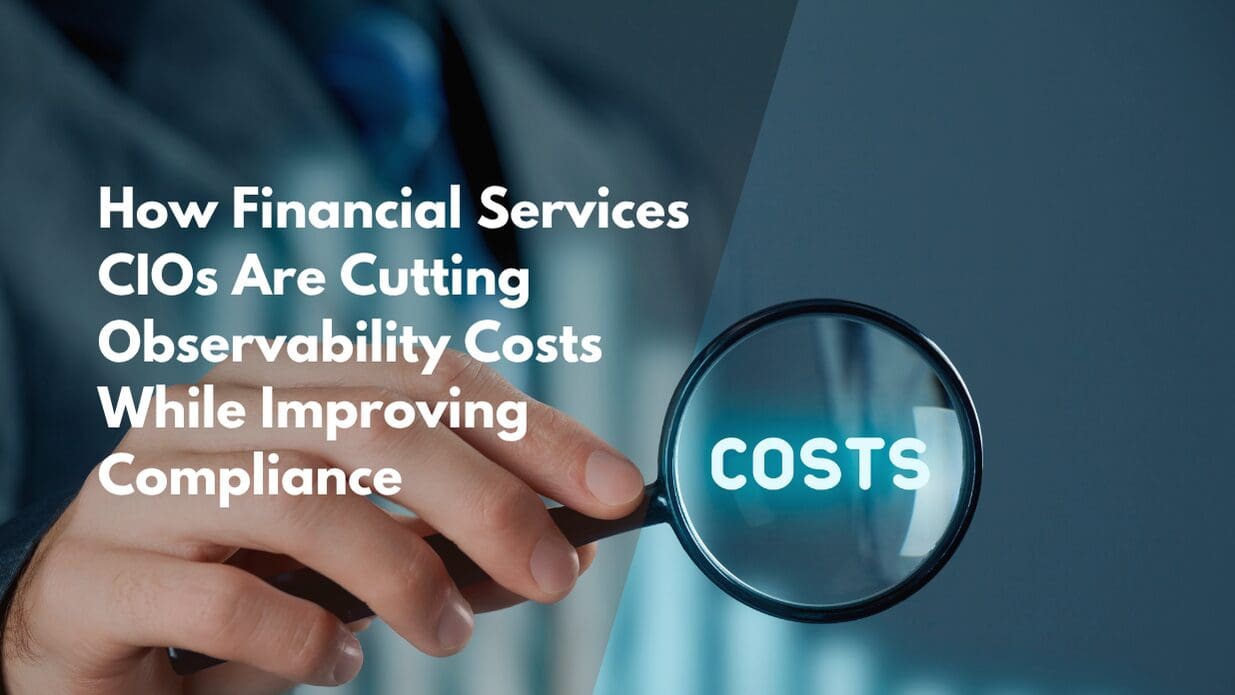In the financial sector today, CIOs face a dual challenge: Reducing IT expenditures and supporting other business units while ensuring strict adherence to regulations like GDPR, PCI-DSS, and SOX. This balancing act becomes increasingly complex as observability data volumes grow exponentially.
According to a Capgemini report, 56% of business leaders will prioritize cost reduction over revenue growth this fiscal year. In telemetry management, this means choosing solutions that reduce runtime expenses, minimize downtime, and maximize resource efficiency, while still delivering actionable insights into system health.
The Data Dilemma: Rising Costs and Compliance Pressures
Financial institutions are inundated with vast amounts of telemetry data—logs, metrics, traces—that are essential for monitoring system health and ensuring compliance.
However, managing this data is costly. For instance, the average cost of downtime in the financial services industry is estimated at $152 million annually, with regulatory fines and legal costs contributing significantly to this figure.
Moreover, traditional observability platforms often charge based on data ingestion volumes. This model can lead to escalating costs as data volumes grow, making it imperative for CIOs to find solutions that can manage data efficiently without compromising compliance.
Apica’s Telemetry Pipeline: Streamlining Data and Reducing Costs
Apica’s Telemetry Pipeline solution is designed to filter unnecessary data before it reaches expensive observability platforms. By acting as a first-mile data collector, Apica’s pipeline can reduce data volumes significantly, directly decreasing the costs associated with data storage and analysis.
This approach not only cuts costs but also ensures that only relevant data is processed, enhancing the efficiency of observability tools and reducing the noise that can obscure critical insights.
Reducing Observability Licensing Costs While Enhancing Compliance
In many organizations, observability platforms charge based on data ingestion volumes—this model often leads to escalating costs as telemetry data grows. For CIOs and engineering leaders, it’s critical to manage this data efficiently without compromising compliance.
Key Benefits of a Strategic Telemetry Pipeline
- Filter Before You Pay: If you intervene before data reaches high-cost observability tools, you can eliminate redundant or low-value telemetry. Filtering out noise reduces ingestion volumes dramatically, leading to substantial licensing savings.
- Cost Efficiency Meets Compliance: With your pipeline processing only relevant data, observability tools operate on focused and essential information. This not only lowers costs but also streamlines compliance reporting. You maintain visibility into required data while avoiding penalties tied to excessive storage or processing.
- No Regrets on Data Integrity: A well-designed pipeline holds critical data securely. Instead of discarding everything, it precisely differentiates between necessary and unnecessary data, ensuring all information essential for regulatory audits and governance is retained.
This approach empowers organizations to meet strict regulatory standards—whether GDPR, PCI-DSS, SOX, or others—while tightly controlling observability spend and keeping telemetry costs in check.
Furthermore, the streamlined data allowed for more efficient compliance reporting, as only pertinent information was processed and analyzed, ensuring adherence to regulatory requirements without incurring additional costs.
Ensuring Compliance Without Data Loss
In the financial industry, data integrity is paramount. Apica’s persistent pipeline ensures that no critical data is lost during the filtering process. The system is designed to retain all essential information required for compliance, providing a safety net that guarantees regulatory standards are met without the need for excessive data storage.
To that end, enterprises can maintain comprehensive records for audits and compliance checks while avoiding the costs associated with storing vast amounts of unnecessary data.
Identifying and Managing High-Cardinality Data
High-cardinality data—data with a large number of unique values—can significantly skyrocket storage and processing costs without necessarily adding value.
Apica’s Telemetry Pipeline includes tools to identify such data, allowing organizations to make informed decisions about what information is essential and what can be filtered out.
By focusing on meaningful metrics and discarding superfluous data, financial institutions can optimize observability strategies, ensuring that resources are allocated efficiently and compliance is still maintained.
Re-Assess Your Observability Strategy
As digital-first challenges proliferate, traditional financial institutions are accelerating their shift toward cloud-native and multi-cloud observability platforms. This isn’t just a fringe trend—it’s mainstream now.
A global survey of 300 banking and financial services CIOs underscores the shift—and the pain points IT and DevOps teams now face. The Key insights include:
- Data overload: 71% of CIOs say the volume of observability and security data generated by cloud-native systems is overwhelming human capacity.
- Tool sprawl: Organizations rely on an average of 10 distinct monitoring tools, yet manage just 9 % of their environments effectively.
- Operational complexity: Nearly 88% report increasing technology-stack complexity over the past year, and 51 % expect it to grow further.
- Skill gaps: 72% of Mid-Size Companies Face Significant Cloud Management Talent Shortage, Hindering Business Growth
Understanding and managing observability costs is vital for financial institutions aiming to maintain compliance without overspending.
Apica offers an Observability Cost Calculator and a free consultation to help organizations assess their current strategies and identify opportunities for improvement.
Moreover, we’re giving teams access to enterprise-grade telemetry data management and observability with 1TB monthly data ingestion, unlimited users, and zero storage costs.
Try out Apica Freemium today.




